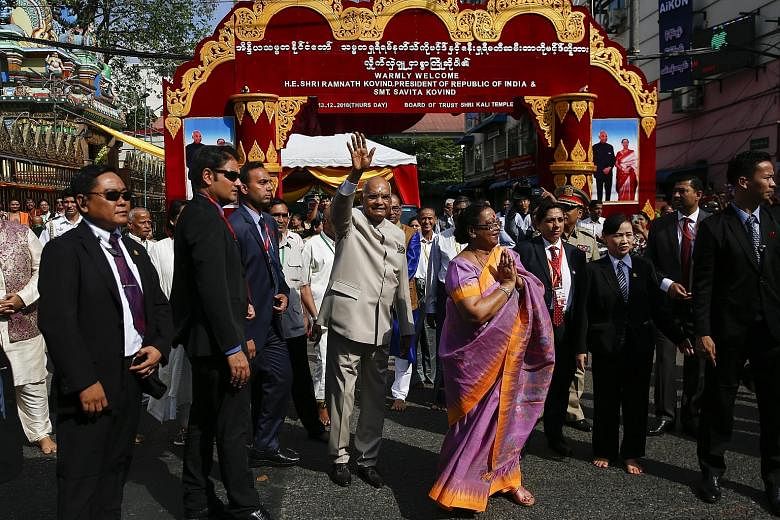India continues to deepen its strategic engagement with Myanmar, a key interlocutor in its Act East policy, amid growing concerns of Chinese influence in the country.
President Ram Nath Kovind concluded a five-day visit to Myanmar last Friday, during which India sought to synergise its Act East and Neighbourhood First initiatives with Myanmar's "independent, active and non-aligned" foreign policy.
The presidential visit to Naypyidaw - the first since 2006 - came a little over a month after China and Myanmar finalised a deal to build a sea port in Kyaukpyu on Myanmar's western coast. It gives China an alternative route for energy imports from West Asia and avoids potential choke points in the Malacca Strait.
In India, however, the deal is perceived more as a security nightmare - the latest addition to a Chinese "string of pearls" across the Indian Ocean that comprises ports such as Gwadar in Pakistan and Hambantota in Sri Lanka. India fears these projects will allow the Chinese military greater access into its extended neighbourhood.
India is therefore courting Myanmar by offering to fund and work on development projects and boosting connectivity with the country.
This is also why it has adopted a more realpolitik-driven approach that falls shy of censuring Myanmar for its military's role in human rights violations against the Rohingya. During his visit, the Indian President appreciated Myanmar's efforts towards achieving peace and national reconciliation.
He also handed over the first 50 units of prefabricated houses for Rohingya refugees, built in Rakhine State with money from the Indian government. India may also expand the Rakhine State Development Programme once the current allocation of US$25 million (S$34 million) is fully committed.
"The Chinese influence is pervasive and writ large on the entire foreign policy of India," Professor Swaran Singh from the School of International Studies at Jawaharlal Nehru University told The Straits Times. "It is so pervasive because of the enormity of both the magnitude and speed with which the Chinese are expanding their footprint and building their infrastructure in Myanmar."
The two nations also signed a memorandum of understanding in September to establish the China-Myanmar Economic Corridor. China has already constructed dual-carriage motorways connecting Kunming in Yunnan province with towns on the Myanmar border.
Playing catch-up, India has launched a range of connectivity projects, including a trilateral India-Myanmar-Thailand highway, tested bus services and opened border markets. It is also working with Myanmar to develop the Kaladan Multi-Modal Transit Transport Project that connects Kolkata to the port in Sittwe, in Rakhine State, which is then connected to India's north-east via road and river networks.
Myanmar is important to India because it is the only physical gateway for India to connect with South-east Asia and beyond. It is also a key security partner in India's campaign against different insurgency groups, some of whom have a presence in Myanmar.
But both India and China realise there is more to gain through cooperation than rivalry. "The Chinese have realised that their big infrastructure development projects face enormous problems on two fronts - commercial viability and political legitimacy," said Prof Singh.
"If India starts using ports such as Gwadar, Kyaukpyu and Hambantota, they will become commercially viable. The Chinese understand this, which is why they are cultivating and courting India very clearly."

